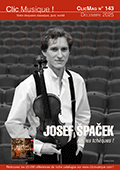 Stories need no plan. Stories suffice in their form, flow and fantasy. Thibault Falk is a passionate story-teller, and so it is hardly a surprise that he does not seem to bother with plans. The songs from "Sur Le Fil", rendered with skillful ease and grace, beg no analysis or examination. They have a life of their own and propel themselves with poetic urgency. Thibault Falk tells us the old tale of setting off and returning home; the immortal theme of the artist who is drawn to the far-reaches, later to discover upon his return the very thing which so long he had sought. Perhaps this subject seems at first appearance incompatible with our modern virtual age, where our environment itself changes more quickly than the speed at which we can move from one place to another. But in truth, the turning of time has left our yearnings and primal instincts unchanged. Thibault Falk's secret is his continuity; however he thwarts expectation. He does not succumb to the tempting cliché of exotic sounds, proclaiming tales of adventure. The pianist is a Romantic, but not a dreamer. In his travels Falk has remained true to his own self and has learned to appreciate, love and defend what he had left at home. Back in Berlin, he takes flight in those sounds he left behind. He has returned to the warmth, intimacy and trust he and his band-mates had once enjoyed. So he resumes with his new CD right where he had left off with the last-ahead to the roots. Thibault Falk has no need to reinvent himself to express his essential qualities: constancy in movement, reliability in transience, calm in the disorder. His tales seem familiar. We recognize the sound from the history of jazz. Falk has no trouble acknowledging jazz in its pure form. The sepia tone, not only of the sound, but also in the interaction of the quartet, bridges the gap between memory and the present. Last but not least, "Sur Le Fil" is a Berlin-album, for it tells a story typical of this metropolis, traversed by the river Spree: the meeting of four musicians rooted in France, Poland, Denmark and the USA who bring not only their own stories, but also their slang, quirks and preferences. And still it is a Berlin-story. Unimpressed by the ever-changing Avant-Garde musical language, predominant there today, they play freely and relaxed. This freedom is however idiomatic, not structural, for stories need no plan; they suffice in their form, flow, and fantasy. Wolf Kampmann
 |
